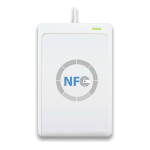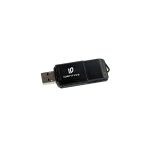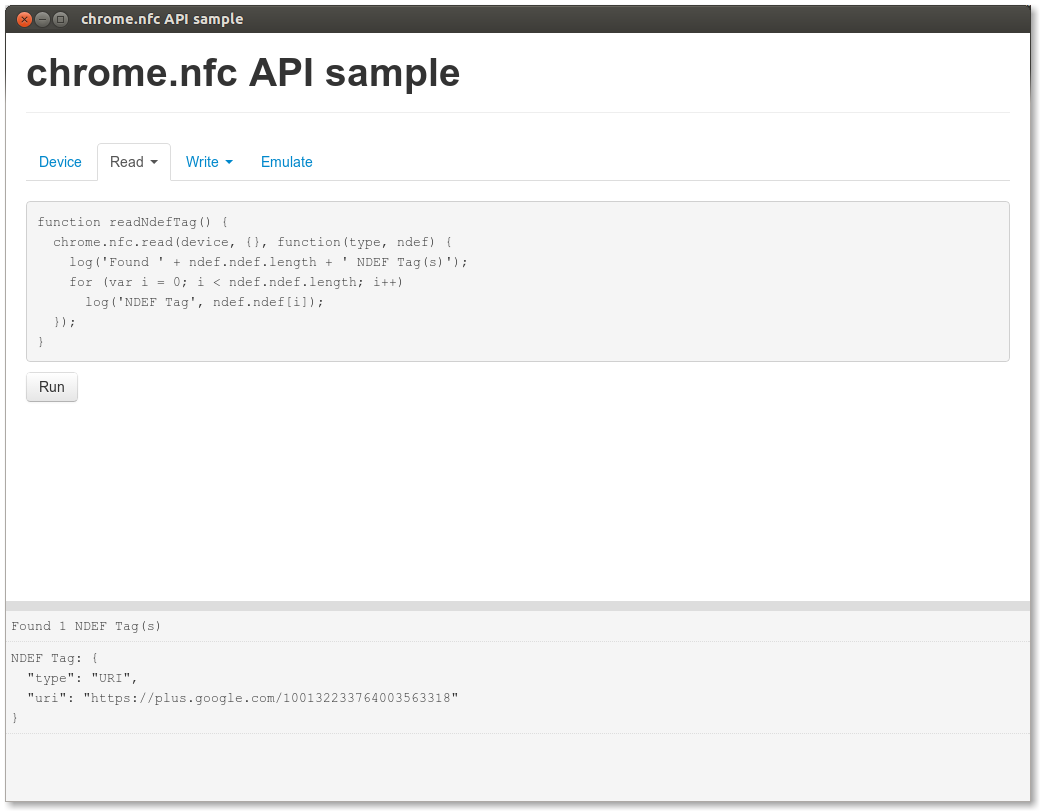With this simple library, you can build a Chrome App that communicates over USB with NFC Readers.
| ACR122U | SCL3711 |
|---|---|
 |
 |
- Check
Developer Modeinchrome://extensions - Click "Load unpacked extension..." in
chrome://extensionsand select the sample folder. - Launch it.
Learn more about USB Devices Caveats at https://developer.chrome.com/apps/app_usb#caveats
Once you've imported the chrome-nfc.js javascript library into your Chrome App, you need to add the permissions below to your manifest file:
"permissions": [
"usb",
{
"usbDevices": [
{ "vendorId": 1254, "productId": 21905 }, // SCL3711
{ "vendorId": 1839, "productId": 8704 } // ACR122U
]
}
]chrome.nfc.findDevices(function(devices) {
console.log("Found " + devices.length + " NFC device(s)");
for (var i = 0; i < devices.length; i++) {
var device = devices[i];
console.log(device.vendorId, device.productId);
}
});chrome.nfc.findDevices(function(devices) {
var device = devices[0];
chrome.nfc.read(device, {}, function(type, ndef) {
console.log(ndef);
var uri = ndef.ndef[0]["uri"];
console.log(uri);
var text = ndef.ndef[1]["text"];
console.log(text);
});
});chrome.nfc.findDevices(function(devices) {
var device = devices[0];
var ndef = [
{"text": "Chromium.org website" },
{"uri": "http://chromium.org" },
{"aar": "com.google.samples.apps.iosched" },
];
chrome.nfc.write(device, {"ndef": ndef}, function(rc) {
if (!rc) {
console.log("WRITE() success!");
} else {
console.log("WRITE() FAILED, rc = " + rc);
}
});
});chrome.nfc.findDevices(function(devices) {
var device = devices[0];
var ndef = [
{"type": "URI", "uri": "http://chromium.org"}
];
chrome.nfc.emulate_tag(device, {"ndef": ndef}, function(rc) {
if (!rc) {
console.log("EMULATE() success!");
} else {
console.log("EMULATE() FAILED, rc = " + rc);
}
});
});chrome.nfc.findDevices(function(devices) {
var device = devices[0];
chrome.nfc.read_logic(device, 0, 2, function(rc, data) {
console.log(UTIL_BytesToHex(data));
});
});chrome.nfc.findDevices(function(devices) {
var device = devices[0];
var data = new Uint8Array([ // NDEF(http://google.com)
0xdb, 0x00, 0x03, 0xe1, 0x00, 0x00, 0x00, 0x00, // block 0 (MAD1)
0x00, 0x00, 0x00, 0x00, 0x00, 0x00, 0x00, 0x00,
0x00, 0x00, 0x00, 0x00, 0x00, 0x00, 0x00, 0x00, // block 1 (MAD1)
0x00, 0x00, 0x00, 0x00, 0x00, 0x00, 0x00, 0x00,
0x03, 0x0f, 0xd1, 0x01, 0x0b, 0x55, 0x03, 0x67, // block 2 (NDEF)
0x6f, 0x6f, 0x67, 0x6c, 0x65, 0x2e, 0x63, 0x6f,
0x6d, 0xfe, 0x00, 0x00, 0x00, 0x00, 0x00, 0x00, // block 3 (NDEF)
0x00, 0x00, 0x00, 0x00, 0x00, 0x00, 0x00, 0x00,
]);
chrome.nfc.write_logic(device, 0, data, function(rc) {
console.log("WRITE_LOGIC() SUCCESS");
});
});Compiling script requires Python 3.0 and will use online Closure Compiler. Just run
python3 compile.py
and the library will be written to chrome-nfc.js.
